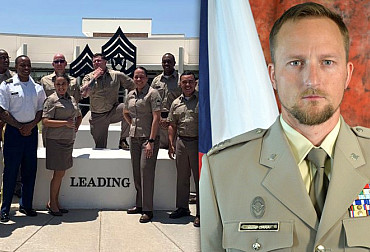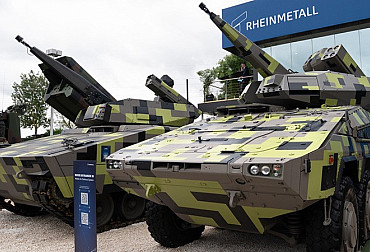The future of UAV in the ACR
The Russian-Ukrainian conflict represents a major incentive for the ambitious plan for the transformation of the Czech Army, which has been presented politically and professionally for a long time, and a significant strengthening of its capabilities to defend the borders and territory of the Czech Republic. Most European NATO countries, led by Germany, have also announced plans to significantly increase defense spending and capabilities of their armed forces.
Upcoming purchases of new combat vehicles, replacement of helicopters or consideration of new fighter aircraft are certainly crucial for the development of the capabilities of the Czech Army. But they must also be accompanied by the adoption of new military technologies and the introduction of new weapons and reconnaissance systems that enable their effective use. However, the difficult economic situation and the potential lack of available funds will also require careful preparation of modernization programs in the different branches of the armed forces.
One of the progressive and effective technologies that is increasingly changing the landscape of current and future warfare is Unmanned Aircraft Systems (UAS), consisting of unmanned aerial vehicles (UAVs), programming and control devices, logistics and service equipment, and auxiliary systems.
From the experience of using UAVs in the Russian-Ukrainian conflict
Combat operations of both the Ukrainian and Russian armies are accompanied by significant use of drones, from mini-UAVs to long-range UAV systems with high endurance, about which not much is known. Thanks to effective air defense, aerospace pilots in the airspace of Ukraine have gained a dominant position for manned aircraft in solving aerial reconnaissance and target setting tasks. Attack drones, capable of causing significant damage to both small mobile targets and large Ukrainian critical infrastructure, have proven to be extremely important in carrying out strike missions both on the front line and deep into Ukrainian or Russian territory.
Combat operations on both sides are highly combined, with priority and extensive use of ground formations coming to the fore. In this regard, large-caliber artillery and multiple rocket launchers have gained special importance and importance, in the use of which the search and identification of targets and the rapid transfer of information to the firing units play a very important role. Reconnaissance UAVs play a crucial role in this on both sides of the front, starting with commercial quadcopters and ending with strategic reconnaissance UAVs. Their use is, of course, limited by the weather, but also by the capabilities of the opponent's air defense.
 Picture: Method of deployment and range of flying target detection and air defense systems used by the Russian military in the conflict in Ukraine | U.S. Army
Picture: Method of deployment and range of flying target detection and air defense systems used by the Russian military in the conflict in Ukraine | U.S. Army
Advanced aviation capabilities and new technologies have attributed an auxiliary role in the Russian-Ukrainian conflict, limited to the use of mainly attack and army aviation to provide air support to frontline units against stationary targets at tactical and operational-tactical depth and to destroy identified means of air defense at long, medium and short distances using missiles and guided bombs.
Strike Air Force practically does not perform tasks in the operational depth of enemy troops in the destruction of communication equipment (bridges, crossroads, railway junctions, railway sets with soldiers and equipment). Its role in destroying the enemy's critical infrastructure was taken over by long-range kamikaze drones. However, for massive fire attacks in the depth of enemy defenses, tens to hundreds of these drones need to be used to ensure overwhelm and reliable overhaul of the air defense and range system the desired effect of destruction of critical infrastructure objects.
UAV for Czech Army
The Army of the Czech Republic, in the search for a suitable solution to reconnaissance tasks in the new conditions, reasonably followed the proven Israeli UAS Heron 1 (see Fig. (2), designed for remote sensing out of range of enemy air defenses). Reliability and efficiency, excellent access, deployment from runways at an altitude of 3300 m, from air bases in the Himalayas and Andes. High reliability and readiness for any mission are defined both by resistance to temperature extremes from +45° to -40° Celsius, or by the ability to fly even in monsoon rains and strong winds. In addition to Israel, 16 other countries have these aircraft in service, including tier one users along the years, as well by the EU and its European Border Guard Agency.
 Picture: Heron 1 UAV landing at Ben-Gurion Airport in Israel | IAI
Picture: Heron 1 UAV landing at Ben-Gurion Airport in Israel | IAI
Heron 1 UAV can climb to an altitude of 10,000 meters with a maximum take-off weight of up to 1,270 kg and a payload of up to 250 kg and, depending on the ratio of load and fuel, can last up to 40 hours in the air without the need to land. Propulsion by a quiet aviation engine allows this machine to fly classified intelligence missions unaccompanied by the characteristic buzzing noise, known for example from Ukraine when deploying Iranian Shahid-136 machines or Turkish Bayraktar TB-2 drones. The EO/IR/LRF/LD electro-optical targeting system, carried under the fuselage, incorporates infrared and visible light cameras that provide a real-time image of the battlefield in all lighting conditions. The payload capsule, which also includes a laser rangefinder and laser designator, allows tracking, surveying, targeting and distance measurement. As a result, the Heron 1, as a multirole aircraft, can reliably find and recognize potential targets from many kilometers, determine their coordinates with high accuracy, and direct fire from its own combat assets to them via the control station.
As the experience of the fighting in Ukraine shows, the speed of using reconnaissance information to intervene against detected and recognized targets is crucial for the successful deployment of these machines. The logical next step that the Czech Army should take is to consider purchasing special payloads capabilities, and it is here that I see the future of the development of the unmanned air force of the Czech Army.





















